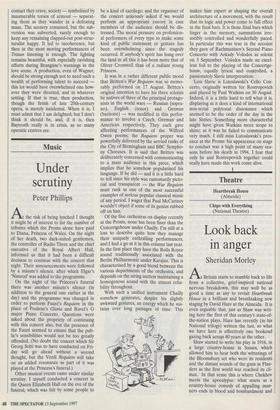Music
Under scrutiny
Peter Phillips
Athe risk of being lynched I thought it might be of interest to list the number of tributes which the Proms alone have paid to Diana, Princess of Wales. On the night of her death, two dark-suited gentlemen, the controller of Radio Three and the chief executive of the Royal Albert Hall, informed us that it had been a difficult decision to continue with the concert that night. Their announcements were followed by a minute's silence, after which Elgar's `Nimrod' was added to the programme.
On the night of the Princess's funeral there was another minute's silence (in addition to the general one earlier in the day) and the programme was changed in order to perform Faures Requiem in the place of Poulenc's Gloria and Ravel's G major Piano Concerto. Questions were asked about the propriety of continuing with this concert also, but the presence of the Faure seemed to ensure that the pub- lic's sensibilities would not be too greatly offended. (No doubt the concert which Sir Georg Solti was to have conducted on Fri- day will go ahead without a second thought, but the Verdi Requiem will take on an added resonance as part of it was played at the Princess's funeral.)
Other musical events came under similar scrutiny. I myself conducted a concert in the Queen Elizabeth Hall on the eve of the funeral, which was felt by some people to be a kind of sacrilege; and the organiser of the concert anxiously asked if we would perform an appropriate encore in case members of the audience should be dis- tressed. The moral pressure on profession- al performers of every type to make some kind of public statement or gesture has been overwhelming since the tragedy occurred. If anybody's spirit has hung over the land in all this it has been more that of Oliver Cromwell than of a radiant young Princess.
It was in a rather different public mood that Britten's War Requiem was so memo- rably performed on 17 August. Britten's original intention to have his three soloists be natives of three of the principal protago- nists in the world wars — Russian (sopra- no), English (tenor) and German (baritone) — was modified in this perfor- mance to involve a Czech, German and American respectively. They each gave affecting performances of the Wilfred Owen poems; the Requiem proper was powerfully delivered by the serried ranks of the City of Birmingham and BBC Sympho- ny Choruses. It is said that Britten was deliberately concerned with communicating to a mass audience in this piece, which implies that he somehow popularised his language. If he did — and it is a little hard to tell since his style was customarily picto- rial and transparent — the War Requiem must rank as one of the most successful examples of serious popular classical music of any period. I wager that Paul McCartney wouldn't object if some of its genius rubbed off on him.
Of the fine orchestras on display recently at the Proms, none has been finer than the Concertgebouw under Chailly. I'm still at a loss to describe quite how they manage their uniquely enthralling performances, and I had a go at it in this column last year. In the first place they have the Rolls Royce sound traditionally associated with the Berlin Philharmonic under Karajan. This is characterised by a good blend between the various departments of the orchestra, and depends on the string section maintaining a homogenous sound with the utmost relia- bility throughout.
With such a unified instrument Chailly somehow generates, despite his slightly awkward gestures, an energy which he sus- tains over long passages of time. This makes him expert at shaping the overall architecture of a movement, with the result that its logic and power come to full effect in the final bars. It is those final bars which linger in the memory, summations irre- sistibly controlled and wonderfully paced. In particular this was true in the account they gave of Rachmaninov's Second Piano Concerto with Arkady Volodos as soloist on 3 September. Volodos made an excel- lent foil to the playing of the Concertge- bouw, equally lyrical and controlled, a passionately Slavic interpretation.
Less Slavic is Lutoslawski's Cello Con- certo, originally written for Rostropovich and played by Paul Watkins on 30 August. Indeed, it is a little hard to tell what it is, displaying as it does a kind of international non-serial polytonal dissonance which seemed to be the order of the day in the late Sixties. Something more characterful might have given Watkins more scope to shine; as it was he failed to communicate very much. I still miss Lutoslawski's pres- ence at the Proms: his appearance on stage to conduct was a high point of many sea- sons before his death in 1994. I fear that only he and Rostropovich together could really have made this work come alive.


































































 Previous page
Previous page